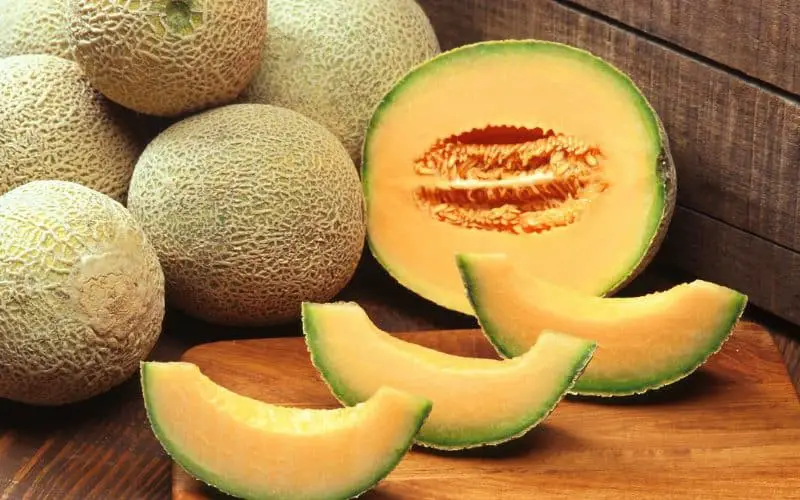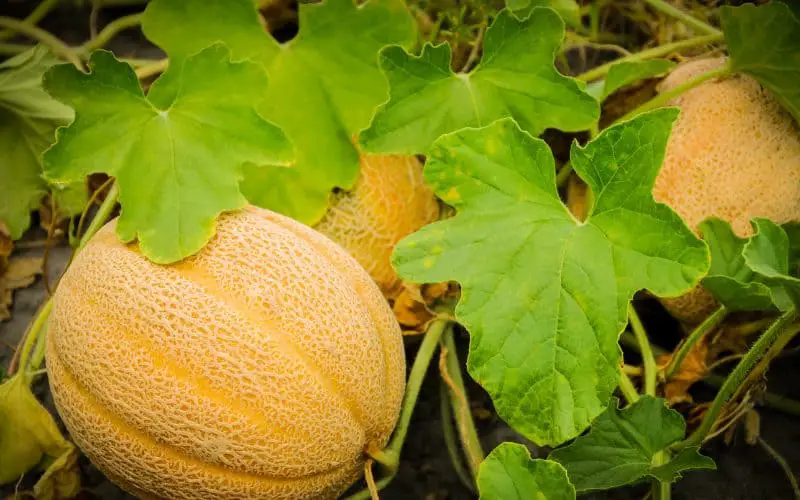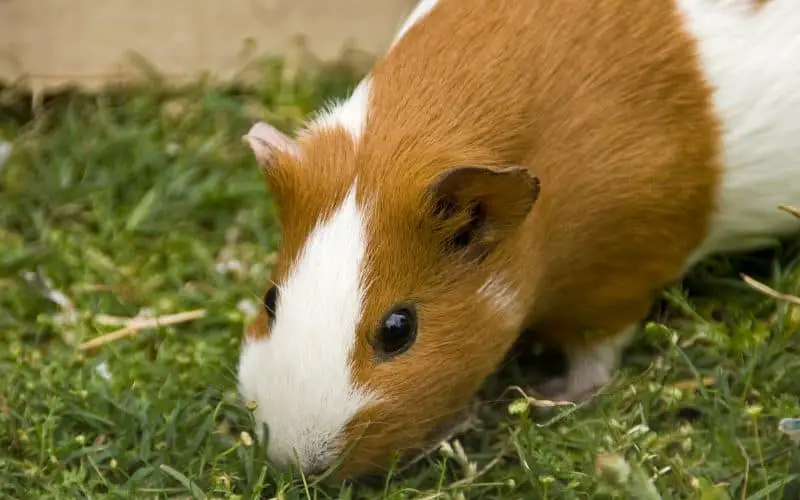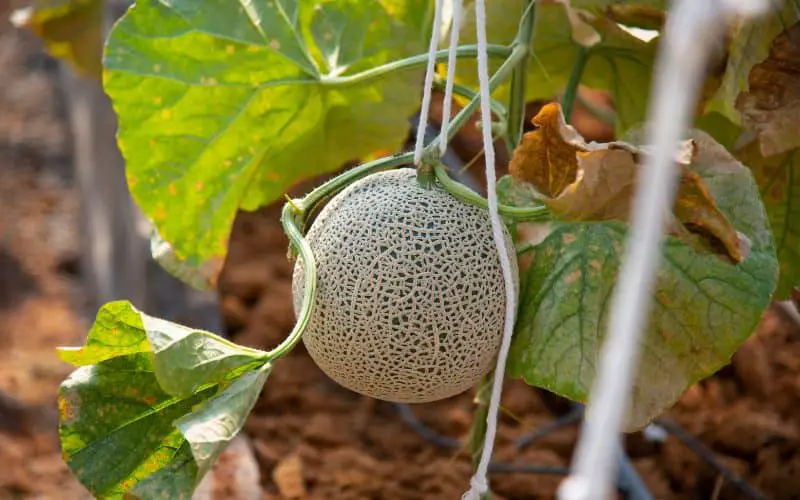Cantaloupe (sweet melon or rockmelon) is a weird-looking melon that’s rich in vitamins and minerals. It is indeed a juicy, sweet fruit for cavies (and even humans). You will mostly find cantaloupe during summer; that’s when people rush after the fruit to have a bite.
Probably, you bought some cantaloupe from the market, had a bite, and it tasted awesome; hence, you’re considering passing some to your guinea pig. But, can guinea pigs eat cantaloupe? Does cantaloupe contain nutritional ingredients that are good for guinea pigs?
Well, the short answer is YES, guinea pigs can eat cantaloupe, but there are exceptions, which we’ll discuss below.
You should know that guinea pigs shouldn’t be fed with just any food or fruit, and for cantaloupe, let’s see what it does to cavies.
Can Guinea Pigs Eat Cantaloupe?
Yes, there is nothing wrong with feeding your guinea pigs with cantaloupe. However, fruits (generally) are not to be served to cavies regularly. It is advised that fruits are served as treats due to high sugar concentration.
Fruits are known to be high on sugar compared to hays and veggies. If you’re looking to serve cantaloupe as a snack to your cavies, that’s not a problem at all. But, if you’re looking to make cantaloupe a food for your cavies, that’s where the problem comes in.
We can’t be too sure about your pet(s), but virtually all guinea pigs that taste cantaloupe ends up loving the fruit. Serve a bite to your cavy and watch the reaction – arguably, it would ask for more bites! It is good to treat your cavies with varieties; it helps their system and makes them love you more.
- Read Also: Can Guinea Pigs Eat Marple Leaves?
Is Cantaloupe Bad For Your Guinea Pigs?

No, cantaloupe is good for all guinea pigs (including nursing ones, young ones, matured ones, and pregnant ones). However, due to the sugar content in cantaloupe, your guinea pigs shouldn’t eat this fruit all the time. Why? Just as with humans, excess sugar isn’t good for the body.
Hence, although your cavies may love cantaloupe, you should be cautious about how frequently you allow them to eat the fruit. Feeding them with cantaloupe more often than supposed may cause them to face the following ailments.
Diarrhea
The digestive system in guinea pigs is highly sensitive and reactive. It quickly reacts to a change of diet/food and could force the cavies to suffer diarrhea.
When you feed guinea pigs with cantaloupe more often, there’s every possibility that they’ll be diagnosed with severe diarrhea in no distant time.
Diabetes
When sugar is in excess quantity in the body, diabetes is sure to kick in. Your guinea pigs may likely suffer from diabetes due to the high sugar content in cantaloupe. Although it is natural sugar, it is yet harmful to their system when it becomes excess.
Obesity
Many guinea pig farmers/rearers have reported about obesity – this is a common avoidable issue. Excess sugar can lead to obesity; if you minimize how frequently you feed your cavies with stuff that contain much sugar, they won’t suffer from obesity.
Bloating
Excess alkaline can cause bloating in guinea pigs, and cantaloupe is an alkaline fruit. Thus, the frequent serving of cantaloupe can lead to excess alkaline, leading to bloating.
However, these side effects of cantaloupe are not applicable to all guinea pigs. We have listed them because there are some guinea pigs that suffer from these side effects due to the frequent serving of cantaloupe. Your cavies may or may not suffer from these; kindly discuss with your vet for more info.
Nevertheless, cantaloupe packs many nutrients that will help guinea pigs’ systems grow and develop. Below is a rundown of the nutritional value of cantaloupe fruit.
The Ingredients in Cantaloupe
| Nutrients | Amount |
|---|---|
| Carbs | 8.16 g / 100 g |
| Calcium | 9 mg / 100 g |
| Calories | 34 Kcal |
| Fat | 0.19 g / 100 g |
| Fiber | 0.9 g / 100 g |
| Folate | 21µg / 100 g |
| Phosphorous | 15 mg / 100 g |
| Protein | 0.84 g / 100 g |
| Potassium | 267 mg / 100 g |
| Sugar | 7.86 g / 100 g |
| Vitamin A | 3382 IU |
| Vitamin C | 36.7 mg / 100 g |
| Water | 90.15 g / 100 g |
The chart above shows the different nutrients available in cantaloupe fruit. Interestingly, most of these nutrients are needed by guinea pigs to stay healthy and strong.
Let’s evaluate some of these nutrients to understand what they do to guinea pigs’ body systems and even humans.
Calcium
Calcium helps bones formation and growth; lack of calcium in Guinea pigs will make them look weak and unhealthy. Even human beings need calcium to stay strong and healthy – it is an essential nutrient for virtually all living things.
Phosphorous
Phosphorous helps the cavies’ body system absorb other nutrients (including protein & fats) from their various snacks/food.
Potassium
Potassium is essential – it helps the body retain water and reduces the risk of stone formation. Your guinea pigs really need this nutrient.
Folate
Cavies need folic acid, and this is provided by Folate, which is one of the nutrients available in cantaloupe. This nutrient helps in blood cell formation and fosters quick recovery from wounds.
Also, Folate helps to convert carbohydrates to energy, and this is essential for pregnant, nursing, and young guinea pigs.
Vitamin A
Vitamins play a crucial role in the general health of cavies, and vitamin A is one of those vitamins your cavies need. Vitamin A is also essential for the healthy growth of the body. The presence of Vitamin A helps to promote tissues, good eyesight, and the formation of certain hormones.
Vitamin C
Vitamin C is one of the most needed nutrients for guinea pigs; its deficiency can cause a lot of things. This vitamin boosts the immune system to fight against sicknesses and diseases. It also promotes guinea pigs’ general health and helps to absorb iron to keep the body in good shape.
With the few analysis above, it is quite certain that guinea pigs need to be served with cantaloupe. But then, they shouldn’t eat cantaloupe as much as humans eat the fruit. Just as a popular saying goes, “too much of everything is bad.”
Benefits Of Serving Cantaloupe To Guinea Pigs

If moderately served, cantaloupe is one of the best snacks you can give to your cavies occasionally. The fruit has a bunch of benefits to deliver to your little pet(s). Below, we have analyzed the few benefits of feeding guinea pigs with cantaloupe.
Hydration
As much as cantaloupe is high in sugar, it is also high in water. The excess water in cantaloupe will help to keep your guinea pigs hydrated. Basically, guinea pigs don’t drink much water; this is why it is advisable to treat them with fruits like watermelon, cantaloupe, etc. with much water inside.
Serving cavies with cantaloupe is essential, especially during the hot summer days – it will keep them hydrated and shelve certain ailments that may result from dehydration.
Effective Immune System
Vitamins and minerals are known to be among the top nutrients that help boost the immune system in humans – that’s also the case with guinea pigs. The vitamin and mineral nutrients in cantaloupe are essential for your cavies’ immune systems.
If you want them to stay healthy at all times, then you should treat them with these fruits once in a while.
Helps In Growth
Most nutrients deposited by cantaloupe are essential for the growth of guinea pigs. Vitamin A, Folate, Phosphorous, etc. are all essential nutrients that will help young/newborn guinea pigs grow seamlessly but fortify their bodies’ tissues and organs.
Checkmates Scurvy
There’s no other way your guinea pig pet(s) can get vitamin C except the food you serve them. This is why you should serve them cantaloupe to deposit vitamin C into their systems. Vitamin C is a compulsory nutrient for cavies.
In fact, it is advised (by most vets) to feed guinea pigs with vitamin C on a daily basis. But this doesn’t mean you should serve them cantaloupe every day.
There are many other guinea pig foods that contain vitamin C. Lack of vitamin c will cause your cavy to suffer scurvy and could lead to there severe ailments too.
Antioxidant and Anti-Inflammatory Support
Another benefit of cantaloupe is this – it deposits antioxidant and anti-inflammatory compounds into the body systems of cavies. Cantaloupe can save your pet from various inflammatory diseases, thanks to its phytonutrients.
Also, cantaloupe can help deter oxidative stress from having a negative effect on your little cavy’s health. The fruit genuinely improves protection against various diseases and sicknesses faced by most guinea pigs.
How To Serve Cantaloupe To Guinea Pigs

When you want to eat cantaloupe, you could finish a bunch of it, but it’s time to serve it to your guinea pigs; just a slice is enough. There are a lot of nutrients in a slice of cantaloupe, enough to deposit all the benefits your cavy can get from eating the fruit.
It is important to note that melons are served as snacks to guinea pigs; they are not food. You just have to add cantaloupe (or any other melon) to your guinea pig’s diet because of the important nutrients it possesses.
However, younger guinea pigs may require smaller sized slices than what the older ones get. Serving melons to your guinea pigs depend on age, diet, and other variable factors.
If you’re following a vet-recommended diet, reach out to the vet and ask for the exact size of cantaloupe your cavies should eat.
There are so many fruits (over of them) guinea pigs can eat; cantaloupe is just one of them. Therefore, one in a while, you should change your guinea pigs’ diet to add new varieties. Also, although you’re serving your guinea pigs small-sized slices of cantaloupe, you shouldn’t let them eat the fruit every day.
Important Notice: Ensure that the cantaloupe you’re serving to your cavies is still fresh. Also, wash the fruit very well before dishing it out. Anything being served to guinea pigs must be clean and fresh. Well, who doesn’t love fresh stuff?
How Many Times Should Cavies Eat Cantaloupe?
So, how frequently should you serve cantaloupe to guinea pigs? It is imperative that you know when to serve snacks to your guinea pigs.
It is ideal to serve cantaloupe to your guinea pigs once in a week. But, if you love spoiling our guinea pigs with good stuff, you can make it twice a week. You will be causing more harm than good if you go beyond twice per week to something higher.
This is because the nutrients in cantaloupe are almost in high amounts; your cavy doesn’t need them in excess quantity. The only nutrient you should bother, whether it’s excess in your cavies’ systems, is vitamin C.
One thing to always have in mind is that guinea pigs should eat snacks sparsely; hence, since cantaloupes are meant to be snacks for guinea pigs, it should be served in that manner.
Your cavies may ask for more after biting this tasty fruit, but you shouldn’t fall for that! It’s in their nature to eat always and all the time. Instead, you can throw in some veggies, so they can get busy with the veggies after eating a slice of cantaloupe.
Can Guinea Pigs Eat Cantaloupe Seeds?
The answer is NO. Even human beings don’t eat seeds in fruits. Cantaloupe seeds are choking hazards; the seeds are quite big, and though, apparently, no guinea pig will be able to digest such a meal.
However, cantaloupe seeds have more vitamin and fiber content than the rest of the fruit. Well, your cavies need these nutrients, but not at the expense of their general health. The yellowish edible part of cantaloupe contains a reasonable amount of those nutrients, too.
Is It Safe For Cavies To Eat Cantaloupe Rinds?
No, it is not advisable to allow your cavies to eat the rinds of any fruit (not just cantaloupe). Usually, rinds are, though, contain some tiny thongs and other stuff, making it very difficult for guinea pigs to digest them.
It is not totally awkward that rinds contain some chemical waxes used as preservatives. This can cause your cavies’ serious ailments, of which diarrhea is one of the commonest. Simply cut them off while serving cantaloupe to your piggies.
Can Guinea Pigs Drink Cantaloupe Juice?
Again, the answer is NO. You should serve cantaloupe juice to guinea pigs. Well, not just cantaloupe juice, but guinea pigs aren’t supposed to be served any kind of juice. Why? Typically, juices are made with the addition of more sugar and other additives to improve the taste.
The nutrients in cantaloupe are almost in high amount; adding more additives may be harmful to your piggies’ health. So, it is best advised to avoid serving your guinea pigs with any sort of juices.
What About Frozen Cantaloupe?
So, you preserved some cantaloupes in the freezer, and they’re all frozen? Well, you could still eat them and enjoy every bit, but as for your guinea pigs, they don’t serve such a treat. Frozen fruits and foods are not good for guinea pigs; they are not to eat too cold things.
Cold and frozen stuff could cause guinea pigs to fall sick. If all the cantaloupes at home are frozen, remove them from the freezer and keep at a place where they can defreeze and become less cold. Only when the fruit is thawed to room temperature, that’s when it’s safe to be given to guinea pigs.
This also applies to all frozen stuff you may want to feed your cavies (you must thaw them first).
You might get enticed to throw a cold piece in for a refreshing summer snack. However, you must remember it is not the best choice of food for your guinea pigs.
How To Prepare Cantaloupe For Cavies
Here’s how to prepare the cantaloupe you’re about to serve your guinea pigs. Well, it’s almost the same way you’d prepare other fruits for your piggies.
First things first, the cantaloupe must be ripe and fresh; avoid cantaloupes with green spots. Then, you can follow the steps below to get it ready.
- Peel off the rinds and slice the fruit
- Remove the seeds (all of them)
- Get a clean bowl or plate, cut the sliced pieces in bits and pour into the bowl/plate
- Serve to your guinea pigs
After a while, return and remove the leftovers / uneaten cantaloupe from the den. If the leftovers are left for long, they will bring flies and rodents to attack your cavies. Just as you should always serve clean, natural herbs, fruits, and veggies to your piggies, you should also keep their cage(s) clean always.
Conclusion
Can guinea pigs eat cantaloupe? Yes, they can – it is one of the best snacks you can serve them up to twice a week. There are other food/fruits that guinea pigs can eat. We would always recommend that you keep in touch with a vet regarding your cavies’ health.
